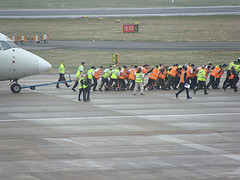A few weeks ago Nad took part in a fund raising event for injured forces; on the television this week I watched “Battle for Haditha” recreating the events leading to a massacre of Iraqi civilians by US Marines and “The Passion” recreating the events leading to the first Easter and the crucifixion of Jesus; and in the news are the reflections of 5 years of bloodshed, occupation, freedom, and fledgling velocity (choose your own words) in Iraq and of rioting in Tibet.
Look around you, can you see
times are troubled, people grieve
see the violence, feel the hardness
all my people, weep with me
Kyrie Eleison, Jody Page Clark
 Nad maintains the website for ForcesHospitalCharity.org, which was set up by the emergency services at Birmingham Airport in response to seeing the injured soldiers brought back from Afghanistan and Iraq. The charity does not in any way support the forces in the field, or politically support the conflicts themselves, but is purely about humanitarian aid for those people who have returned, often with severe injuries, and for their families. However, despite this Nad has been criticised by those who ask “question why (he), a Muslim, (has) chosen to support a charity that attempts to aid the very soldiers that are killing our brothers and sisters abroad.” (see Nad’s blog entry).
Nad maintains the website for ForcesHospitalCharity.org, which was set up by the emergency services at Birmingham Airport in response to seeing the injured soldiers brought back from Afghanistan and Iraq. The charity does not in any way support the forces in the field, or politically support the conflicts themselves, but is purely about humanitarian aid for those people who have returned, often with severe injuries, and for their families. However, despite this Nad has been criticised by those who ask “question why (he), a Muslim, (has) chosen to support a charity that attempts to aid the very soldiers that are killing our brothers and sisters abroad.” (see Nad’s blog entry).
In the “Battle for Haditha” both US Marine’s and Iraqi ‘insurgents’ were shown as people who in different ways cared and protected their own. It is natural and human to care for those close to us, who share ties of family, nationality, race or religion. Those closest to us, our children, parents, friends, have first place in our affections and often a special call on us. This human love is a good thing. But is not the end of things.
I was disappointed that the Dalai Lama, whilst outspoken against Chinese actions against Tibetan rioters, was relatively muted in addressing Tibetans themselves. The riots there began with Tibetan crowds attacking ethnic Han Chinese and even Muslim Hui. The targets here were not police stations and public buildings, but shops, homes and ordinary people. It seems the Chinese held back for fear of international sentiment while ordinary people were killed or made homeless. Then when the Chinese security forces were unleashed they struck hard … hitting back at those who had hurt their own.
 In the Dalai Lama’s press release he says that “a form of cultural genocide has taken place in Tibet”, “the Chinese government discriminates against these minority nationalities”, and in their response to the situation the authorities “believe that further repressive measures” are the way forward – this is I am sure all true. However, in contrast, about the rioters themselves, the Dali Lama merely says “the demonstrations and protests taking place in Tibet are a spontaneous outburst of public resentment built up by years of repression”.
In the Dalai Lama’s press release he says that “a form of cultural genocide has taken place in Tibet”, “the Chinese government discriminates against these minority nationalities”, and in their response to the situation the authorities “believe that further repressive measures” are the way forward – this is I am sure all true. However, in contrast, about the rioters themselves, the Dali Lama merely says “the demonstrations and protests taking place in Tibet are a spontaneous outburst of public resentment built up by years of repression”.
Why is it so hard for him to denounce the ethnic attacks of Tibetans themselves as well as the repression of the Chinese authorities? But I know I am the same, overlooking the understandable failings of those close to me or those I support, whilst feeling righteous anger over the way they, the other, treat my own kind.
The Dalai Lama shows a deep, and human love for those he is responsible for.
In Gethsemane, one of Jesus’ friends, tries to defend him when temple guards come to arrest him. The unnamed disciple (I always assume Peter), strikes with his sword and cuts off the ear of the High Priest’s slave. Jesus admonishes his followers and heals the slave. On other occasions Jesus talks with, shares food with or heals Jewish Priests, Roman Centurians, lepers and prostitutes – friends and enemies, the unclean and the immoral,
In a recent blog “A Charter for Compassion“, Nad discusses a TedTalk by Karen Armstrong on the Golden Rule. This comes in many forms, some more about harm “Hurt no one so that no one may hurt you”, some about behaviour “do unto others as you would have them do unto you”. Most personal is the form from Leviticus “Love your neighbour as yourself”.
But who is my neighbour? My family, friends, the Welsh (maybe even the English), people I work with, the person next door, in this Internet age perhaps FaceBook friends, or people who add my photos as Flickr favourites? Jesus is asked this and in response tells the story of the “Good Samaritan”. In school I recall we wrote variants of this where the Jew and the Samaritan were replaced by rival football teams, or Catholics and Protestants in Northern Ireland. This story of the Samaritan caring for someone who would have despised and persecuted him goes beyond human love, it is the love of God.
If the story were told today who more likely that an injured British soldier and young Muslim man.
Those who criticise Nad, show that very human love, just like the Dali Lama, just like I see so often in myself – caring for those close to us, “our brothers and sisters” in race, religion or political beliefs. In working beyond that, Nad shows no less than the Love of God.
 … and beginnings … in September (next week!) I also start to work part-time with Talis. Talis is a remarkable story. A library information systems company that re-invented itself as a Semantic Web company and now, amongst other things, powering the Linked Data at data.gov.uk.
… and beginnings … in September (next week!) I also start to work part-time with Talis. Talis is a remarkable story. A library information systems company that re-invented itself as a Semantic Web company and now, amongst other things, powering the Linked Data at data.gov.uk.



